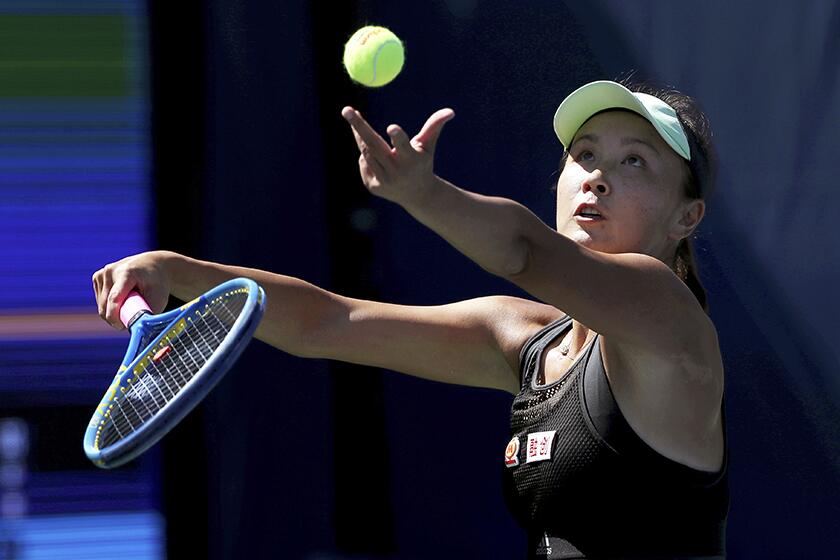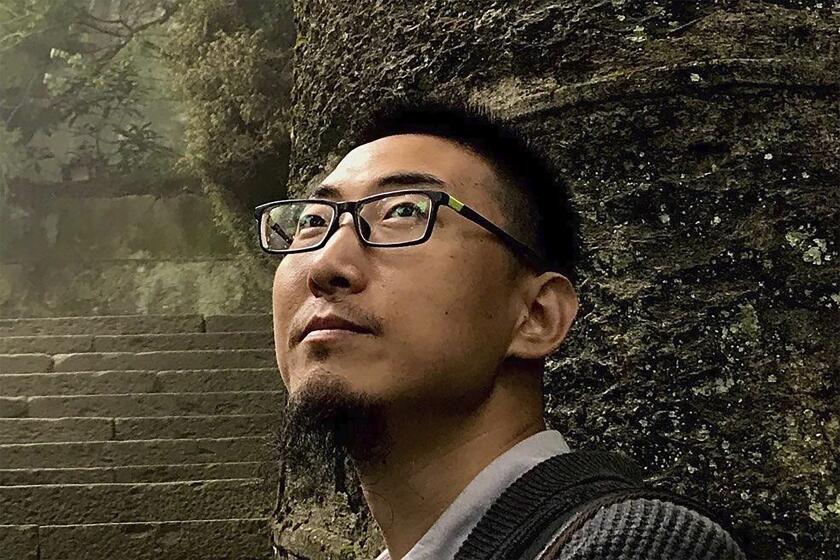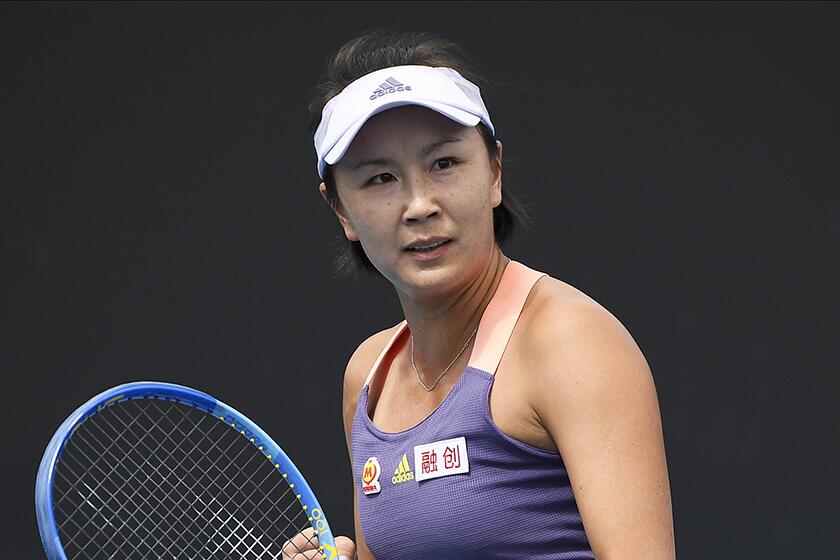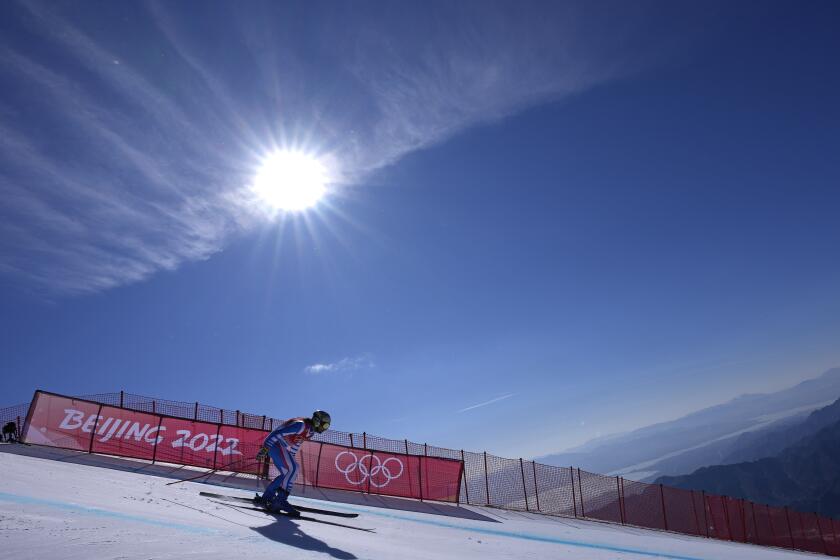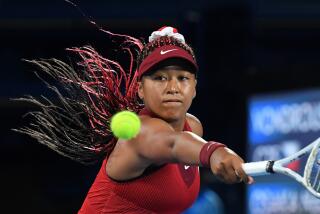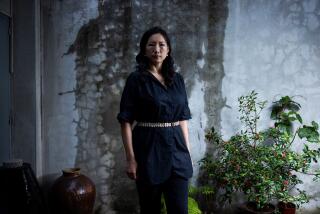Peng Shuai surfaces at the 2022 Olympics with a tightly controlled interview
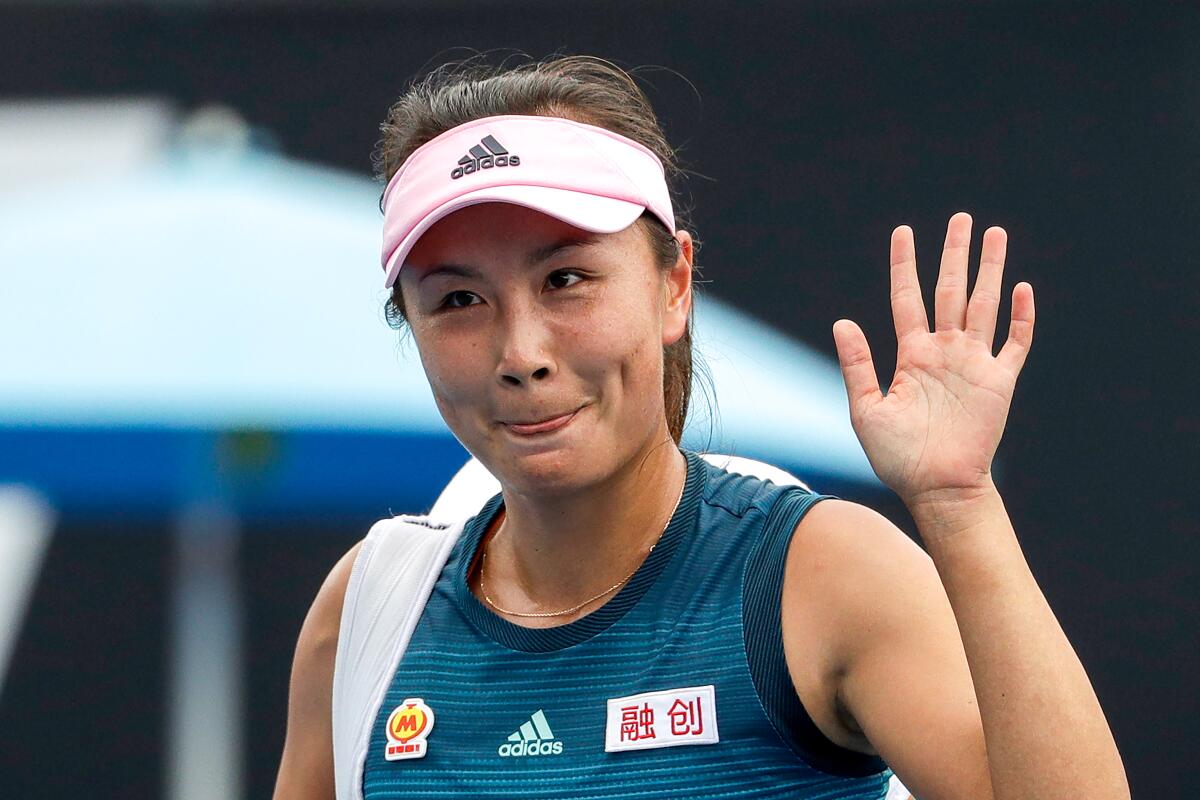
BEIJING — Nothing to see here, move on.
That was the message Chinese tennis player Peng Shuai delivered Monday in a controlled interview in Beijing that touched on sexual assault allegations she made against a former high-ranking member of China’s ruling Communist Party. Her answers — delivered in front of a Chinese Olympic official — left unanswered questions about her well-being and what exactly happened.
The interview with French sports newspaper L’Equipe and an announcement that International Olympic Committee President Thomas Bach met Peng for dinner over the weekend seemed aimed at defusing sustained international concerns about the three-time Olympian and former No. 1-ranked doubles player. Those concerns have threatened to overshadow the Winter Olympics underway in Beijing.
Peng told L’Equipe that the concerns were the result of “an enormous misunderstanding.” But the format of the interview appeared to limit follow-up questions about the allegations and their aftermath. L’Equipe said it submitted questions in advance, a pre-condition for the interview, but also got to ask others that were unplanned. A Chinese Olympic committee official sat in on the discussion, translating Peng’s comments from Chinese, the newspaper said. It said it also used an interpreter in Paris to ensure the accuracy of the comments that it published in French.
Large parts of the hourlong interview, conducted Sunday in a Beijing hotel and organized through China’s Olympic committee with the IOC’s help, focused on Peng’s playing career. At age 36, and after multiple knee surgeries, Peng said she couldn’t envisage a return to tour-level professional tennis. She hasn’t played on the women’s tour since February 2020.
The newspaper published her comments verbatim — which it said was another pre-condition for the interview — in question-and-answer form. Photos of Peng during the interview showed her wearing a red track suit top with “China” in Chinese characters on the front.
L’Equipe asked Peng about the sexual assault allegations that sparked the controversy in November. The allegations were quickly scrubbed from her verified account on a leading Chinese social media platform, Weibo. She subsequently dropped out of public view for a while, leading to “Where is Peng Shuai?” questions online and from players and fans outside of China.
The mysteries and significance of Peng Shuai’s temporary disappearance is roiling China
In her lengthy post, Peng wrote that Zhang Gaoli, a former vice premier and member of the ruling Chinese Communist Party’s all-powerful Politburo Standing Committee, had sexually assaulted her despite her repeated refusals. Her post also said they had had sex once seven years ago and that she had developed romantic feelings for him after that. Zhang has not commented on the accusation.
“Originally, I buried all this in my heart,” Peng wrote. “Why would you even come find me again, take me to your house and force me and you to have sexual relations?”
The interview with L’Equipe was her first sit-down discussion with non-Chinese media since the accusation. She walked back the original post.
“Sexual assault? I never said that anyone made me submit to a sexual assault,” the newspaper quoted her as saying.
The secret detentions of young feminists and labor activists underscore the impunity with which Beijing disappears those deemed a ‘stability’ threat.
“This post resulted in an enormous misunderstanding from the outside world,” she also said. “My wish is that the meaning of this post no longer be skewed.”
Asked by L’Equipe why the post disappeared from Peng’s account, she said: “I erased it.”
“Why? Because I wanted to,” she added.
The obvious follow-up question of why she posted in the first place wasn’t asked.
The IOC also worked Monday to defuse the situation. It said Bach dined with Peng on Saturday, a day after Chinese President Xi Jinping opened the Winter Olympics. The IOC said Peng also attended the China-Norway Olympic curling match with IOC member Kirsty Coventry of Zimbabwe.
The disappearance of tennis star Peng Shuai shines a light on similar cases involving political dissidents, entertainers, business leaders and others.
At his daily Olympic news conference, IOC spokesman Mark Adams wouldn’t say whether the IOC believed Peng was speaking freely or under duress.
“We are a sporting organization, and our job is to remain in contact with her and, as we’ve explained in the past, to carry out personal and quiet diplomacy, to keep in touch with her, as we’ve done,” he said. “I don’t think it’s for us to be able to to judge, in one way, just as it’s not for you to judge either.”
He said the IOC cannot pass judgment on whether there should be an investigation of her initial allegations.
“I think we can say that we are doing everything we can to make sure that this situation is as it should be,” he said.
Breaking News
Get breaking news, investigations, analysis and more signature journalism from the Los Angeles Times in your inbox.
You may occasionally receive promotional content from the Los Angeles Times.
In the interview with L’Equipe, Peng did not reply directly to a question about whether she had been in trouble with Chinese authorities since the post. Instead, she responded with a pat-sounding answer that echoed views often expressed by the Chinese government about sport and politics.
“I want to say first of all that emotions, sport and politics are three clearly separate things,” the newspaper quoted her as saying. “My romantic problems, my private life, should not be mixed with sport and politics.”
Asked what her life has been like since the November posting, she replied: “It is as it should be: nothing special.”
Peng thanked fellow players who expressed concerns about her. They included 23-time Grand Slam champion Serena Williams, who tweeted that “we must not stay silent” in November and called for an investigation.
For China’s leader, a successful Winter Games means international validation. It proves that he has strengthened China and the world must play along.
But Peng also expressed bafflement.
“I would like to know: Why so much worry?” she asked. “I never disappeared. It’s simply that many people, like my friends and among them those from the IOC, sent me messages and it was completely impossible to respond to so many messages.”
The Women’s Tennis Assn. suspended all tournaments in China because of concerns about Peng’s safety. Peng told L’Equipe that a WTA mental health counseling unit sent her emails and a text message.
“That was very unfamiliar to me,” she said. “Why would I need psychological help or that type of thing?”
More to Read
Sign up for Essential California
The most important California stories and recommendations in your inbox every morning.
You may occasionally receive promotional content from the Los Angeles Times.
